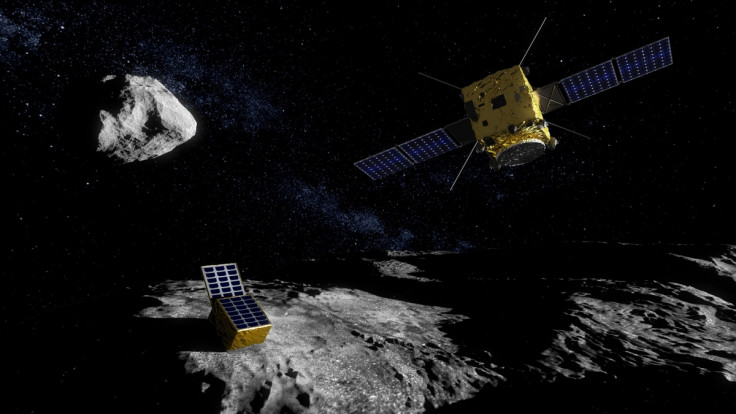ESA sending probe to asteroid to find out if we can prevent armageddon

The European Space Agency (ESA) has revealed the probe it hopes to put on an asteroid as part of its mission to find out whether we can deflect objects heading for Earth. The Mobile Asteroid Surface Scout-2, or Mascot-2, is a microwave-sized lander that will be sent to the asteroid nicknamed "Didymood" as part of ESA's Asteroid Impact Mission (AIM). Scientists hope to probe the asteroid with a range of equipment to find out if and how the course of such space rocks could be altered if they ever posed a threat to Earth.
The asteroid in question is roughly the same size as Egypt's Great Pyramid of Giza − around 170m in diameter − and orbits 1.2km (0.7 miles) above the much larger 800m-diameter Didymos asteroid. The mission will be the first of its kind to a double-asteroid system and, if fruitful, Mascot-2 will be the first probe to successfully touch down on a space rock since Rosetta's Philae lander made its nerve-racking descent onto the surface of 67P/Churyumov–Gerasimenko in November 2014.
After landing, Mascot-2 will use a low-frequency radar to probe the inside of Didymoon and send signals back to AIM mission control. At the same time, accelerometers will record the impact of the lander on the asteroid's surface. Powered by solar panels, Mascot-2 should have "at least" three months to collect the data it needs before running out of juice, according to ESA.
Nasa will assist ESA's mission with its own Double Asteroid Redirection Test (DART) probe in order to provide AIM with "detailed before-and-after mapping to help assess the effects and test planetary defence techniques", with the mission set to blast off in 2022, provided it gets the go-ahead in December this year.
While this may all sound a bit Armageddon, recent events have hammered home just how vulnerable we are spinning through the cosmos, as well as how hazardous that seemingly peaceful void is. The blast caused by a meteor breaking up in the sky over Russia in 2013 was estimated to be equivalent to a 500-kiloton explosion, while just this week a man in India's Tamil Nadu state was struck and killed by what was said to be falling meteorite, although this was later ruled out by Nasa.
Indeed, ESA is taking the whole business pretty seriously: on 30 June, the agency will attempt to spread public awareness of potential asteroid impacts with Earth as part of Asteroid Day, a global event looking at how we can protect the planet from asteroid impacts.
© Copyright IBTimes 2025. All rights reserved.






















